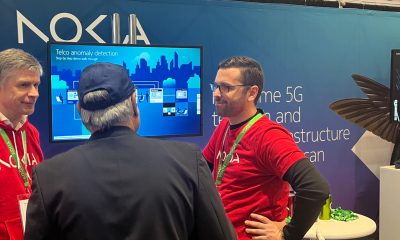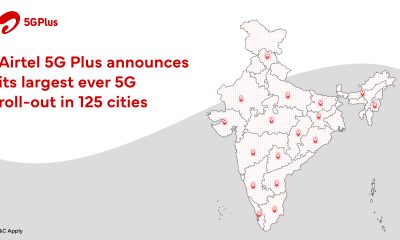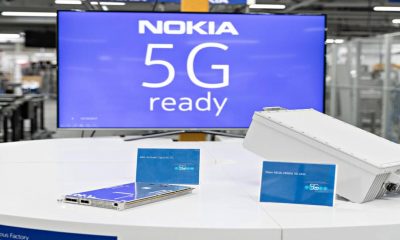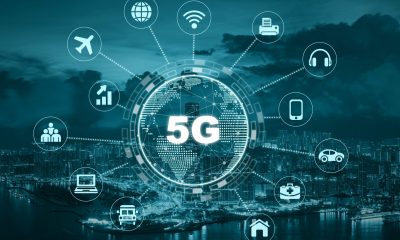5g
5G set to add $8 trillion to global GDP by 2030 : Nokia
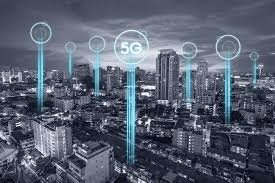
NEW DELHI: 5G-enabled industries have the potential to deliver $8 trillion in value to the global economy by 2030 according to new research from Nokia and Nokia Bell Labs.
The 5G Business Readiness Report surveys 5G adoption among businesses around the world, providing a cross-sector view of the path to full 5G deployment.
This landmark report from Nokia underlines the potential for 5G to drive sustainable economic growth and define the next decade of innovation. The COVID-19 pandemic is forecast to further increase the value creation potential of 5G in the medium and long-term by accelerating digitization, particularly among the least digitally advanced industries.
The report also highlights a clear correlation between 5G deployment and business performance. Companies at an advanced level of 5G adoption were the only group to experience a net increase in productivity (+10%) following COVID-19, and the only group able to maintain or increase customer engagement during the pandemic.
5G mature companies are also growing considerably faster than their peers: 49% of companies in the expansion phase and 37% in the implementation phase – representing the two most advanced stages of 5G maturity – achieved rapid growth last year, compared with 20% in the planning, 11% in discovery and 5% in passive phases. These findings show that the companies who are most 5G mature, and therefore likely also the most advanced in their overall digital transformation, are showing the highest impact in business performance.
Despite the economic challenges of COVID-19, a global boom in 5G investment will see 72% of large companies invest in 5G over the next 5 years. The report forecasts a rapid uptick in investment over the next three years as enterprises seek to expedite digitalization. A third of companies across all regions fear being outpaced by the competition should they not invest in 5G within the next 3 years.
Nokia’s 5G Business Readiness Model reveals that across 8 economies – Australia, Germany, Finland, Japan, Saudi Arabia, South Korea, the UK and the US – 50% of companies are at the midway level on 5G readiness, between initial planning, trials and deployment, compared to just 7% that are classed as 5G mature.
But significant geographic variations exist; while 13% of organizations in Saudi Arabia and 12% in the United States rated as 5G mature, fewer than one in 20 were classed as such in Germany (3%), Finland (2%) and the UK (4%).
While many organizations are at the Implementation stage, for most this still means trials, pilots or early stage deployments such as 5G mobile phones or limited 5G connectivity for fleet services or rural locations. Few have yet to realize the true breadth, depth and potential of 5G.
On average, whilst the importance of 5G adoption is well understood, a significant investment gap remains. 86% of decision makers said they have some kind of strategy for 5G, and over a third fear being outpaced by the competition should they not invest in 5G in the next 3 years. However, only 15% are currently investing in its implementation, and over a quarter (29%) of businesses are not planning any 5G investment in the next 5 years.
Gabriela Styf Sjöman, Chief Strategy Officer at Nokia, said: “As organizations across the world move faster towards deployment of 5G enabled technologies, those who wish to be the first to leverage its potential cannot afford to lose more time. To capture the tremendous opportunities of 5G, organizations must start or intensify their planning now and accelerate business model innovation to remain competitive in a rapidly digitalizing global economy. Beyond investment in the technology itself, this will require digitalizing operations, processes and ways of working to capture the full potential of 5G.”
“5G adoption is categorically shown to fuel business success. Organizations that have integrated 5G stand to benefit from advantages that go way beyond faster, more efficient and reliable network services. As 5G enables businesses to transform, it will also accelerate wider technological and economic trends, with unimaginable possibilities for global economies and societies. The cities, hospitals and factories of the future depend on 5G and the unparalleled ability it offers to move, process and store vast volumes of data. Moreover, the biggest challenges we face as a society – from climate change to the pandemic – can be better tackled through at-scale use of the data and technologies that 5G will unleash.”
Barriers to adoption
The gap between enterprise awareness of 5G’s benefits and current levels of adoption suggests there are notable barriers to implementation. The research identified five principal barriers to 5G adoption for:
Ecosystem availability: Limited availability of key infrastructure outside urban centers was cited by 28% of decision-makers.
Education and understanding: 17% said a key barrier is that decision-makers within their business do not understand 5G, while 14% said they don’t know enough about it themselves.
Awareness: Over a fifth of technology buyers (22%) said that 5G implementation is not a current priority for their business.
Cost and complexity: 15% said they were not confident their company would be able to implement the necessary technologies.
Security: Over a third (34%) said that they are concerned about the security of 5G.
A call to action
The report identifies three key catalysts for change in order to bring about improved understanding, confidence and ultimately adoption of 5G. These are: improved regulation, collaboration and willingness to innovate.
A third of technology buyers said that government investment in infrastructure or subsidies to drive down costs would encourage them to invest more in 5G. Enterprises will not adopt 5G unless the supply from network operators is presented and priced appropriately, which in turn relies on governments and regulators making 5G spectrum in low, mid and high bands available and affordable.
The lack of understanding that exists within some businesses around 5G must be directly addressed. Companies and consumers alike need more information about the technology and how it can both improve operations and solve real world problems, ranging from enterprise use cases to telehealth to green technology.
As companies better understand 5G, they must boldly move to overhaul their operations to accommodate it, for example, exploring how they could use 5G to streamline and more effectively monitor their mobile workforce, fleet or supply chain.
5g
MediaTek Catch-up with Tech: Infinix Zero 30 5G with Dimensity 8020 launched

NEW DELHI: Chipset maker MediaTek, which claims to power more than two billion connected devices every year, hosted ‘Catch-up with Tech’ in collaboration with handset brand Infinix on August 28 to share insightful and engaging conversations about the new-age smartphones and innovative technologies powering everyday lives.
The meet-up threw the spotlight on the MediaTek Dimensity Auto, Satellite solutions and Generative AI along with an extensive showcase of newly-launched Infinix Zero 30 5G powered by MediaTek Dimensity 8020, Infinix GT 10 Pro powered by MediaTek Dimensity 8050, and Infinix QLED TV powered by MediaTek.
In terms of specs, the Infinix Zero 30 5G is tailored for young storytellers and creators, featuring the first-ever smartphone to deliver 4K 60fps video recording from its 108 MP OIS rear camera and ultra-high resolution 50MP front camera. The Zero 30 series powered by MediaTek Dimensity 8020 is said to be a game changer for the front camera vlogging experience along with being the slimmest curved AMOLED smartphone in the segment with glass and a vegan leather back panel. It also claims to be one of the most premium-looking devices in the segment.
The event witnessed a panel discussion moderated by Anuj Sidharth, Deputy Director Marketing & Corporate Communications, MediaTek and included expert panelists from Infinix, MediaTek and two renowned professional photographers.
“With the fifth edition of Catch-up with Tech, we aim to bring consumers closer to the technology and enable them to make informed buying decisions based on their diverse needs. In collaboration with Infinix, this meet-up is in-line with MediaTek’s vision of technology democratization and making innovative technology accessible to everyone,” said Anku Jain, Managing Director, MediaTek India. “The MediaTek Dimensity 8020 in Infinix Zero 30 5G brings faster displays, brilliant cameras and ultra-fast performance. Further, MediaTek Imagiq technologies enrich the capture experience by combining dedicated AI, imaging processors and accelerators to provide incredible results,” he added.
Anish Kapoor, CEO, Infinix Mobile India, said, “Featuring India’s first 50MP 4K 60 fps video recording, Infinix Zero 30 5G is primed to redefine smartphone imaging capabilities, setting a new standard for the creators and vlogging enthusiasts. Our collaboration with MediaTek has played a pivotal role in shaping our exceptional smartphone portfolio, and the Zero 30 5G stands as evidence of our unwavering commitment to innovation and delivering unmatched experiences to our users. The display and design of the device represent a leap forward in smartphone technology. As Infinix Zero 30 5G hits the shelves, we are positive that our customers will find this new offering as exhilarating as we do, further empowering creators to capture their story like never before.”
Radhakrishnan Chakyat, a photography evangelist, founder and host of Pixel Viilage, said, “Infinix Zero 30 5G smartphone powered by MediaTek Dimensity 8020 chipset has amazing hardware features, an excellent camera, dual-view video mode and is primed for optimal content creation and saves a tremendous amount of editing time.”
Aarzoo Khurana, a wildlife photographer, said, “Over the last few days, I clicked various pictures and recorded a few videos with the newly-launched Infinix Zero 30 5G powered by MediaTek Dimensity 8020, and the experience has been truly inspiring. Infinix’s smartphone’s OIS feature helps content creators click shake-free pictures and the front camera, which is extremely sharp and detailed, enables content creators to click countless selfies.”
5g
Nokia launches Nokia MEA Mobile Broadband Index confirming 5G drives digital transformation
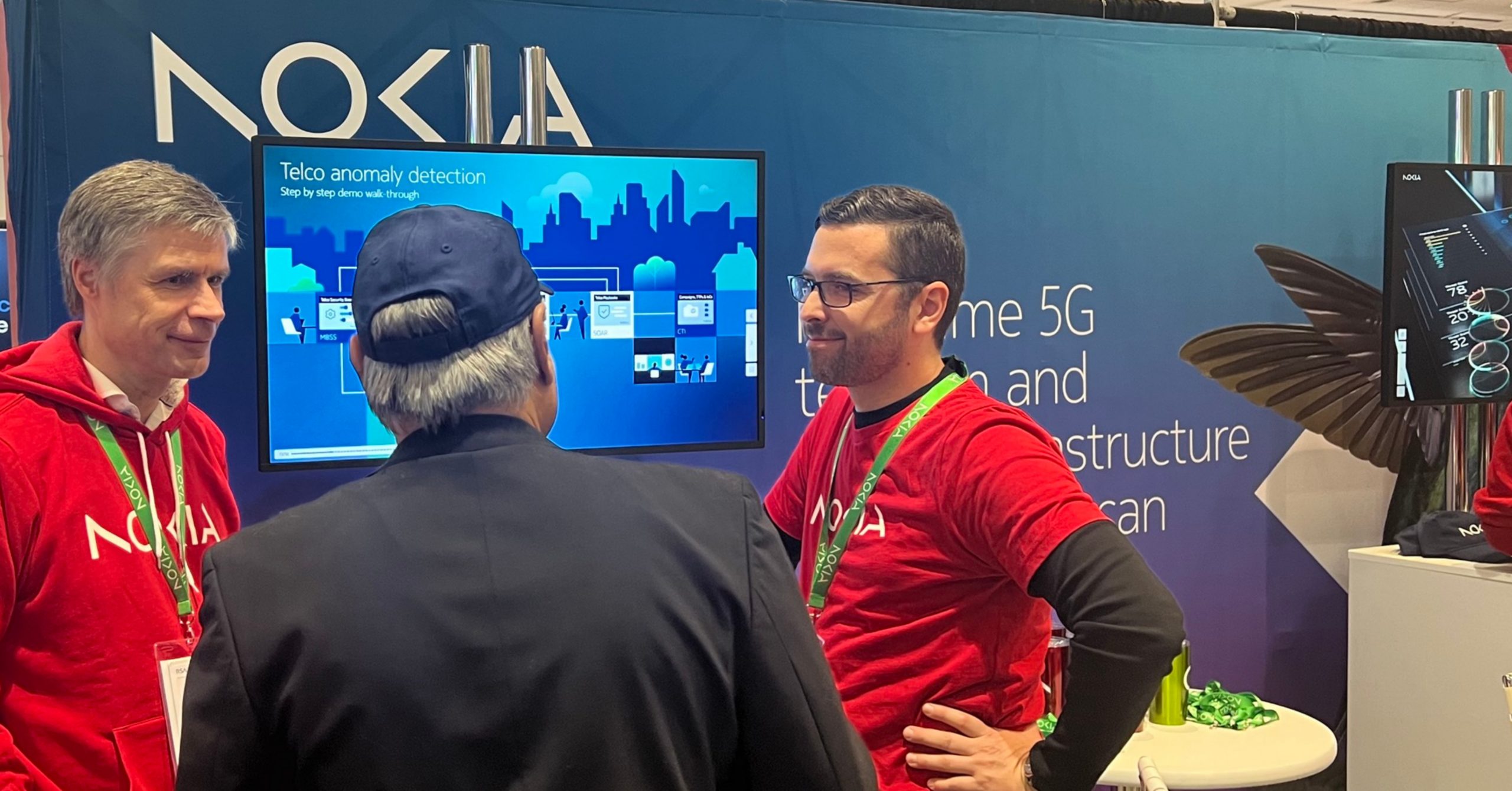
NEW DELHI: Nokia has announced the results of its new research report, the Nokia MEA Mobile Broadband Index, which provides a comprehensive overview of the MEA region’s mobile broadband landscape. The in-depth report highlights the steady growth of 5G in the Middle East and Africa region (MEA) as well as its impact on digital transformation.
It confirms that the Middle East is far ahead of Africa in terms of 5G adoption, while many operators in Africa are still developing their business models around 4G. Voice traffic still relies on 2G and 3G networks in many parts of the region.
5G is forecast to increase steadily and will contribute to the growth of the mobile broadband subscriber base, which is expected to grow with a CAGR of six percent in MEA. According to the report, 4G networks in MEA account for 79 percent of overall data traffic today, and by 2027, 4G and 5G will together account for 90 percent of data traffic. In the same year, 4G subscribers will reach 1,214 million (53 percent of total subscribers) whereas 5G adoption is estimated to reach 380 million subscribers (17 percent of total). Yearly ARPU is estimated to increase at USD$3.4 in 2027, and total data traffic is expected to increase at a CAGR of 32 percent from 2022 to 2027.
The report shows that in the Gulf Cooperation Council (GCC) region, 5G adoption is the fastest, and 5G subscribers are expected to reach 75 percent by 2027, mainly driven by Saudi Arabia. In non-GCC Middle Eastern countries and in Africa, 4G will continue to expand and remain dominant until 2027, while 5G deployment is at nascent stage today and poised to gain more and more momentum over the next years.
As the report confirms, 5G Fixed Wireless Access (FWA) in the GCC countries and 4G FWA in the rest of the MEA region are one of the most attractive use cases, with a significant opportunity for operators to drive incremental revenues. Furthermore, 5G networks are more energy efficient than previous radio network generations, helping operators reach their sustainability targets.
Mikko Lavanti, Head of Mobile Networks at Nokia MEA, said: “MEA is a diverse region with many countries at different stages of development and that is reflected in our report. Data consumption with high-speed networks is increasing exponentially across the MEA market in both urban and rural areas. Reliable 4G and 5G networks are critical for bridging the digital divide in the region, in addition to supporting data-intensive applications for communities and businesses. Nokia is helping both operators and enterprises unlock new opportunities with 5G, building the evolution towards future technologies that will enable enhanced experiences such as the Metaverse.”
5g
Airtel announces its largest ever 5G roll-out in 125 cities
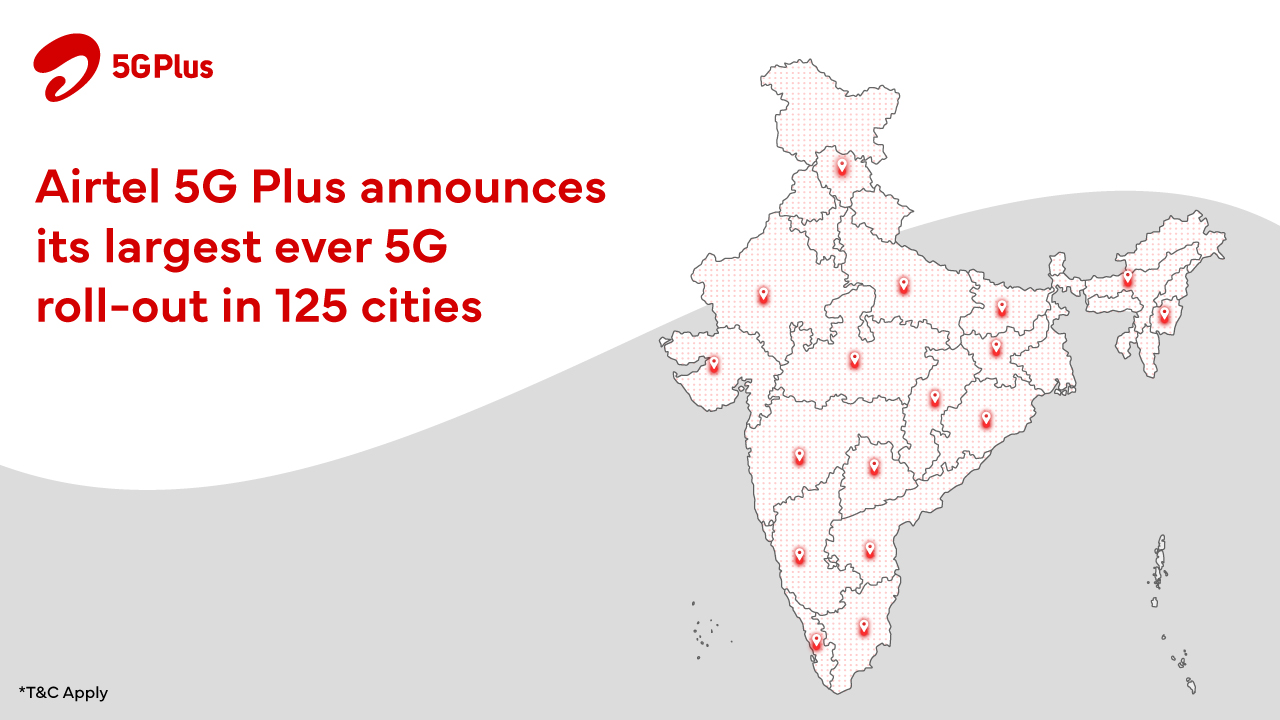
NEW DELHI: Bharti Airtel, India’s telecommunications services provider, today announced the launch of its ultra-fast 5G services in 125 cities. Airtel 5G Plus service is now available to customers in over 265 cities in the country.
Airtel 5G Plus has three compelling advantages for customers. First, it runs on a technology that has the widest acceptance in the world with the most developed ecosystem. This ensures that all 5G smartphones in India seamlessly work on the Airtel network. Second, the company promises to deliver the best experience – between 20 to 30 times higher speeds than today coupled with brilliant voice experience and super-fast call connect. Finally, Airtel 5G Plus network will also be kinder to the environment with its special power reduction solution. Powered by the reliable Airtel network infrastructure, Airtel 5G Plus will provide superfast access to High-Definition video streaming, gaming, multiple chatting, instant uploading of photos et all.
Commenting on the launch, Randeep Sekhon, CTO, Bharti Airtel said, “5G has revolutionized the world of internet, ushering new era of connectivity and communications that will prove to be a game-changer for the country. At Airtel, we remain committed to delivering the highest quality of network and service to our customers as we roll-out 125 more cities today. Airtel was the first in the country to offer 5G services in October 2022, and today’s mega launch is our promise to connect every Airtel customer in the country with ultra-fast Airtel 5G Plus. Our 5G rollout is on track to cover all towns and key rural areas by March 2024.”
Airtel 5G Plus service availability will continue to rapidly expand – including service in all towns and villages in the country soon – as the company is working towards offering nationwide coverage. Airtel is now offering its 5G services in every major city from the upper northern city of Jammu to the southern tip of Kanyakumari.
In the last one year, Airtel has demonstrated the power of 5G with a host of powerful use cases that will change the way customers lead their lives and do business. From India’s first live 5G network in Hyderabad to India’s first private 5G network at the BOSCH facility in Bengaluru to partnering with Mahindra & Mahindra to make its Chakan manufacturing facility, India’s first 5G enabled auto manufacturing unit, Airtel has been at the forefront of 5G innovation.



